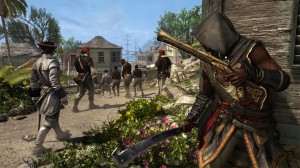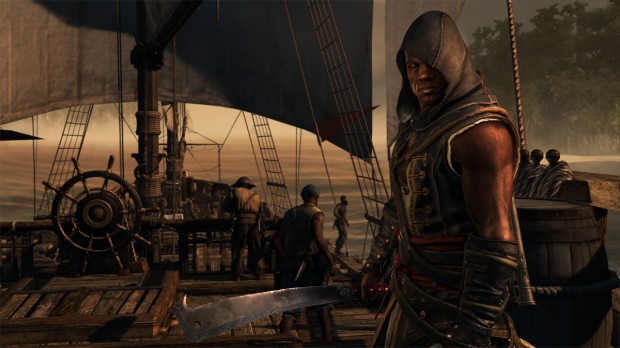Freedom Cry Review (PS4)
- Updated: 21st Jan, 2014
Set fifteen years after the events of Black Flag, this single-player add-on for Assassin’s Creed IV stars you as Adéwalé, Edward Kenway’s former quartermaster. Adé has served as a faithful member of the Assassins until the plight of a faction calling themselves the Maroon draws his attention. This faction of escaped slaves is dedicated to freeing their former comrades still in slavery. If you did the Templar Hunt missions for keys with Kenway, one of these was for a Maroon named Antó.
Freedom Cry opens with an excellent cannonball-slinging, storm-dodging bit of naval action before the sea-spray settles and leaves you back in the familiar ACIV universe of land and sea exploration. There’s no Abstergo storyline here, just pure Adéwalé. You have a single segment of the ACIV map to explore and there’s plenty to do. You’ll quickly realise though, that it’s just another whale to catch, just another shipwreck to explore and just another plantation to invade.
Adé himself plays slightly differently to Edward Kenway. Like Aveline, he wields a machete, as well as the Assassin hidden blades and a blowpipe. He also gains firecrackers during one of the missions, which can be used as a distraction to draw guards away from their usual posts. Perhaps not the most exciting of upgrades, but useful in certain situations.
There’s more depth than in Aveline’s Sony-exclusive DLC. Adé now captains his own ex-slaver ship called the Experto Crede, meaning “Believe one who has had experience in the matter” and the theme runs central to Freedom Cry.
This part of Adéwalé’s life is more noble and more harrowing than anything Kenway achieved in his pirate days. As an escaped slave himself, playing Adé quickly thrusts you into the grim reality of the slave trade. Everywhere you look, slaves are held in cages, up for auction or running through the streets trying to escape their master. Your HUD map will be filled with slaves crying out for help.
It does reach the point of absurdity at times – you kill a guard, break open a cage, release the slaves inside and five minutes later, everything has reset. Men are again locked up in the same cage, men are still being sold on the same auction stage and this time it’s a woman running frantically for her life.
 I suppose you could see this as a metaphor for the times. A lesson that the tiniest actions have no real impact on the system, while Adéwalé himself is proof that the tiny action can transform the life of slave that you freed.
I suppose you could see this as a metaphor for the times. A lesson that the tiniest actions have no real impact on the system, while Adéwalé himself is proof that the tiny action can transform the life of slave that you freed.
However, once you’ve freed a couple dozen slaves like this, the game’s reward system quickly convinces you that large-scale missions are the only way to go. Adéwalé doesn’t spend money on himself, only his ship. To earn better weapons and other upgrades, you need to free slaves. When the next upgrade is 200 slaves away, chasing down slave overseers to help a single person in the street seems like a waste of time that could be better spent sneaking through a plantation to free 90 or more at once.
Again, you could think of it as the struggle between fighting individual and systemic oppression. Or you could just like killing people from haystacks. It’s entirely up to you.
In that sense, Freedom Cry is far more successful than Liberation was at showing gamers how the world can seem very different through the eyes of someone who isn’t a white male hero. It’s still feels a little weird though, to be treating “slaves freed” as a form of currency, a chore to be done so you can get the good machete. I decided to view it as “free this many slaves to prove your dedication so the weapons traders will be willing to offer you better things” but it’s an unsatisfying explanation.
Currency awkwardness aside, the care taken over Adé’s story makes Freedom Cry a must-have for fans of Assassin’s Creed IV. This adventure is filled with moments that will stick with you long after the story missions are complete.



Follow Us!